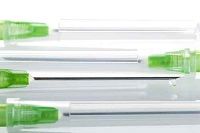Device Maker Comments on Auto Injector Needles for Toddlers
Epinephrine auto-injectors can save lives in cases of anaphylaxis, but their needles are too long for toddlers and infants who weigh less than 15 kg, a device manufacturer confirms. The injectors can strike bone in small children.

[Editor's Note: Responding to this article Mylan stressed that it does not make the injectors used in the referenced study and thus was not specifically commenting on the study results. Mylan's full response has been added at the end of the article]
Auto-injectors used to treat anaphylaxis do indeed have needles that are too long for infants and toddlers, according to a company that makes many of them.
Mylan Specialty, manufacturer of the epinephrine auto-injector Epi Pen, acknowledges that needles in the spring-loaded devices prescribed for use in emergency anaphylaxis are too long to safely inject younger children.
Responding to MD Magazine’s report on research presented March 7 at the American Academy of Asthma, Allergy and Immunology’s annual meeting in Los Angeles, CA, Mylan Specialty issued a detailed statement outlining best practices for using the injectors in cases of infants and toddlers weighing up to 15 kilograms.
The devices are not approved for use on these kids, the company says.
In the study, entitled Sonographic Assessment of Optimal Needle Length for Epinephrine Autoinjectors in Infants and Toddlers, researchers recreated the compression force exerted in discharging an auto injector and compared exposed needle length with skin-to-muscle and skin-to-bone distances using ultrasound. The research was done by Harold L. Kim, MD, of Western University, London Ontario, and colleagues.
“We are aware of the Kim study published in the Journal of Allergy and Clinical Immunology," said a Mylan spokeswoman. "The study examined infants and toddlers weighing 7.5 to 15 kilograms which is a weight range that falls outside of the FDA indication for EpiPen Jr®," " she said.
“If a child is less than 15 kilograms, we encourage parents and caregivers to speak to their healthcare provider about treatment options.
While the term 'epi-pen' is often used to refer to adrenaline auto-injectors in general, the device used in the Kim study was in this case not the Epi Pen, or Epi Pen Jr., Mylan’s device indicated for use in younger patients, but Auvi-Q, an auto injector from Sanofi.
Kim warned in his study that using auto-injectors on infants and children under 15 kilograms could result in bone infections, as well as extreme pain.
[Mylan's full comments are below:]
As originally noted, parents and caregivers should speak to a child’s healthcare professional about treatment options for infants and toddlers weighing less than 15 kilograms. Mylan’s EpiPen Jr® (epinephrine injection) Auto-Injector is indicated for children weighing 15 to 30 kilograms (33 to 66 pounds), and therefore we cannot comment on specific survey findings. The weight designation is part of the product label that is evaluated and issued by the Food and Drug Administration (FDA).
Mylan also requested publication of the following product information:
Indications
EpiPen® (epinephrine injection) 0.3 mg and EpiPen Jr® (epinephrine injection) 0.15 mg Auto-Injectors are for the emergency treatment of life-threatening allergic reactions (anaphylaxis) caused by allergens, exercise, or unknown triggers; and for people who are at increased risk for these reactions. EpiPen® and EpiPen Jr® are intended for immediate administration as emergency supportive therapy only. Seek immediate emergency medical help right away.
Important Safety Information
EpiPen® and EpiPen Jr® Auto-Injectors contain a single dose of epinephrine, which you (or your caregiver or others who may be in a position to administer EpiPen® or EpiPen Jr®) inject into the middle of your outer thigh (upper leg) (through clothing, if necessary). Get emergency medical help right away. You may need further medical attention. Only a healthcare professional should give additional doses of epinephrine if you need more than two injections for a single anaphylactic episode. DO NOT INJECT INTO YOUR VEINS, BUTTOCKS, FINGERS, TOES, HANDS OR FEET. In case of accidental injection, please seek immediate medical treatment. Epinephrine should be used with caution if you have heart disease or are taking certain medicines that can cause heart-related (cardiac) symptoms.
Tell your doctor if you have certain medical conditions such as asthma, depression, thyroid disease, Parkinson’s disease, diabetes, high blood pressure or heart disease, have any other medical conditions, are pregnant or plan to become pregnant, or are breastfeeding or plan to breastfeed. Be sure to also tell your doctor all the medicines you take, especially medicines for asthma. If you have certain medical conditions, or take certain medicines, your condition may get worse or you may have longer lasting side effects when you use EpiPen® or EpiPen Jr®.
The most common side effects may include increase in heart rate, stronger or irregular heartbeat, sweating, nausea or vomiting, difficulty breathing, paleness, dizziness, weakness, shakiness, headache, apprehension, nervousness or anxiety. These side effects may go away if you rest. Tell your healthcare professional if you have any side effect that bothers you or that does not go away.
Please see the full Prescribing Information and Patient Information.
You are encouraged to report negative side effects of prescription drugs to the FDA.